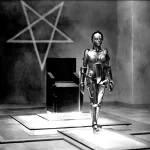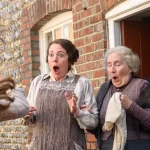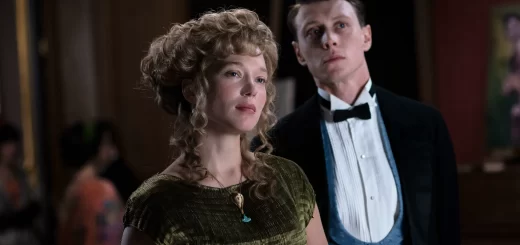Film Stars Don’t Die in Liverpool: The Bad and the Beautiful, by David Bax
Obviously, there’s something compelling about faded movie stars. It’s no accident we’re still referencing Norma Desmond. Maybe it’s because the images of them at the height of their fame are frozen in amber on the screen or maybe it’s just that we’re amused to consider that such people continue to exist after we’ve stopped paying attention to them. In any case, Paul McGuigan’s Film Stars Don’t Die in Liverpool taps directly into this fascination by allowing us to consider that 1950s actor and Oscar winner Gloria Grahame (Annette Bening) could have gone to the movies to see Saturday Night Fever and Alien. McGuigan’s film is obviously about more than that but, as it grinds on, it never returns to anything as alluring as that initial hook.
In the late 1970s, in London, Grahame met and subsequently developed a relationship with a younger actor named Peter Turner (Jamie Bell), from whose memoir Film Stars was adapted. A while after they split up, Grahame returned to Britain and spent some of the last days of her life convalescing at Turner’s parents’ home in Liverpool.
McGuigan and screenwriter Matt Greenhalgh cut back and forth between the two timelines, one describing the rise and fall of their romance and the other detailing those days in Liverpool. The transitions from one track to the other are smooth in a conspicuous way; Peter will walk down a hall in 1981, turn a corner and suddenly be Peter in 1979. These shifts are clever but unilluminating. A more fruitful bit of inventiveness comes when we experience a series of events for a second time, now armed with knowledge we didn’t have before. With the exception of these brief moments, Film Stars adopts Peter’s point of view as its own. Bening is so good in the role that we thirst for more depth in the film’s portrayal of Grahame. It’s enough to make you wonder how much richer the movie might be if she were actually its subject instead of the object of its regard.
McGuigan has two or three other flashes of inspiration that grab hold. The repeated use of “California Dreamin’” as a bittersweet lovers’ theme; the one time Grahame and Turner actually appear on stage together and the camera steadfastly refuses to behold them from the audience’s point of view, reminding us that they are performing only for one another; a brief shot of Grahame’s chipped nail polish signifying how near the end this proud woman must be to not have reapplied before leaving the house. Most commendably, Film Stars is not afraid of silence. On more than one occasion, it holds on Turner’s stolid face for an abnormally long time.
This only works, of course, because of Bell’s ability to transmit volumes while seeming to do nothing. Bening and Bell are—not at all shockingly—the most crucial assets in McGuigan’s arsenal. Their chemistry is vivifying and McGuigan knows how to bottle it. If nothing else, Film Stars is a reminder that, with the right actors, there is perhaps nothing more cinematic than two people dancing together.
The spark fades, though. As goes the love story, so goes the film. We are never made to understand in what way Turner was special to Grahame or if, in fact, the whole point is that he wasn’t any different from her four husbands or anyone else she loved. When it becomes a cancer story, trudging through Grahame’s unremitting decline toward her inevitable death, Film Stars Don’t Die in Liverpool runs out of surprises. That makes for a bad movie in any era.





























